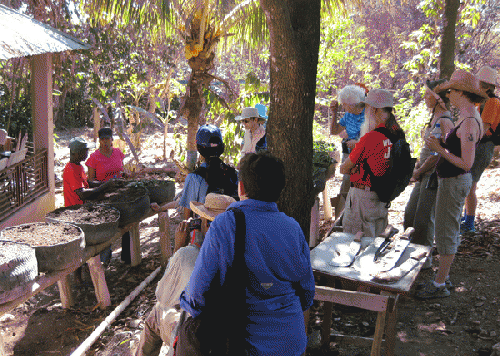Many of Haiti's greatest challenges stem from land issues and the way large scale agriculture has been imposed by external forces. Large plantations, even when successful, have focused on growing products for export, extracting wealth and enriching the few, instead of feeding Haitians. Today, the Haitian government owns a third of all the land. The Catholic church owns another third. Much of what remains is mired in a tangle of ownership claims or with no clear ownership at all, a situation that goes back to the revolution, and has been aggravated by corruption, a lack of bureaucratic infrastructure, and the destruction of many records in the 2010 earthquake.
Because of this lack of clarity, many Haitians build their homes on tiny plots alongside, instead of on the land itself. They are often wary of farming or improving the land because they don't know if they will be kicked off it at any moment. Huge tracts of arable land lay fallow while the country struggles to feed its people, using scarce capital to import the majority of its food.
On a recent trip there working with the peasant rights group
Mouvman Peyizan Papaye (MPP), I learned about MPP's eco-villages, planned villages on the central plateau that are providing long-term living solutions to Haitians still displaced by the 2010 earthquake. These eco-villages are game-changing by the simple fact that MPP has been able to secure the land they sit on, but even more so because MPP is training and supporting the villagers in the use of agricultural methods that allow them to grow enough food on tiny plots of land to feed their families -- and a little bit more -- using methods that don't require chemical inputs, and are thus sustainable, both environmentally and economically.
The eco-villages use converted tires as containers. With a dozen or so tire planters per house, the villagers can grow enough food to live on. With a few more, they can sell some. Using tires transforms an abundant and problematic waste product into an asset that helps conserve water. The tire containers are portable, so freshly harvested containers can easily be switched for newly planted ones. The old ones are dug up, and the soil is amended with new container mix, then replanted anew.
The villagers compost vegetable waste, but they rely more on dung from goats and cows. The dung must be pulverized first, which, we can attest, is incredibly labor-intensive. I remember thinking there must be a simple machine to do this, and there probably is. But that costs money, and there are a lot of things on the wish list above dung breaking machine. The point, though, is that they don't need it. That machine would require capital, which they don't have, to replace labor, which is abundant. For now, doing things this way makes perfect sense. Once the dung is pulverized, it is mixed with sand and dirt to create the container mix.
The villages also plant fruit trees, and other permanent crops, like Moringa, an easy-to-grow, highly nutritional plant that has a multitude of uses. As the villages become more settled, these cash crops will help pay for improvements like solar panels to provide lights and to power the water pumps, helping them move past subsistence farming, toward lives that are secure, comfortable and sustainable.
Part of what makes this type of agriculture sustainable is that on this small scale, animal waste is still part of the cycle instead of a toxic byproduct. The goats that contribute to the container mix are fed leaves from the mango trees they help fertilize. The chickens roam freely, eating insects and making contributions of their own.
And while the villages are using these sustainable methods, MPP is helping to develop more. At the MPP compound, the agronomists are studying drip irrigation, passive water filtration, and fish farming.
It is easy to dismiss such small scale agriculture as inefficient -- small farms are inefficient and big farms are efficient. Partly that's because industrial agriculture externalizes its environmental costs, and because efficiency is more about concentrating wealth than feeding people. But for decades agricultural research -- and the money spent on it -- has focused on better ways to do things big.
MPP and agro-ecologists around the world are studying old-style agricultural methods -- small agricultural methods -- and applying the tools of science and technology to help improve these traditional ways of farming, instead of throwing them out the window in favor of industrial agriculture. They are helping to make small agriculture increasingly efficient and increasingly sustainable. And the more they learn, the more they share with the villagers, with each other, and with us.
Jon McGoran is the author of six novels, including the ecological thrillers Drift, Deadout, and their forthcoming sequel Dust Up, which deal with today's biotech food industry. He has been writing about food and sustainability for over 20 years, (more...)





